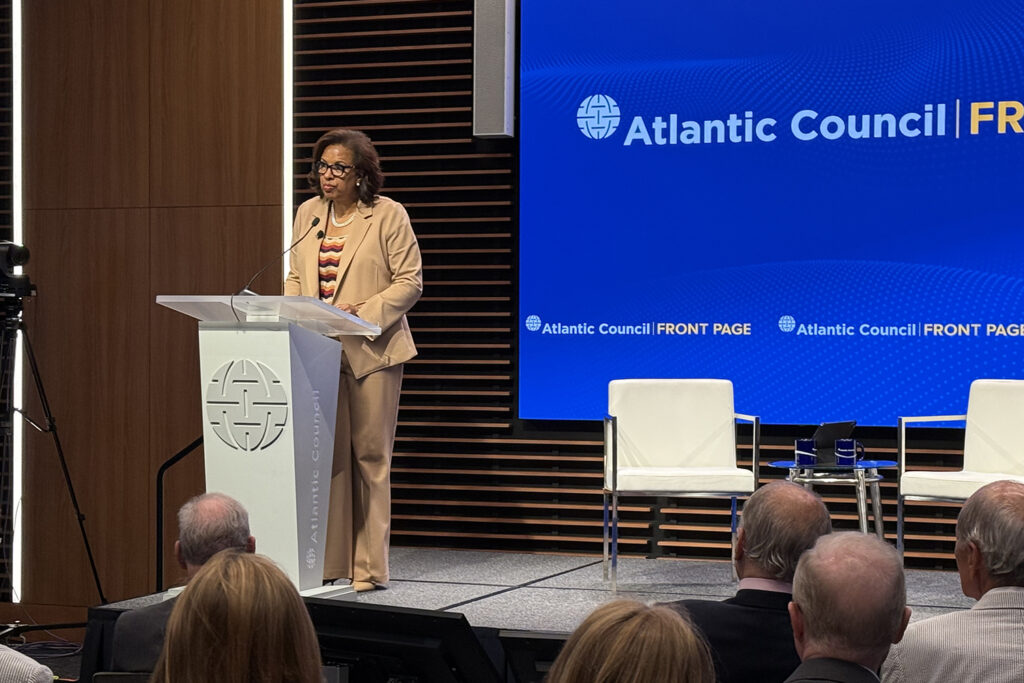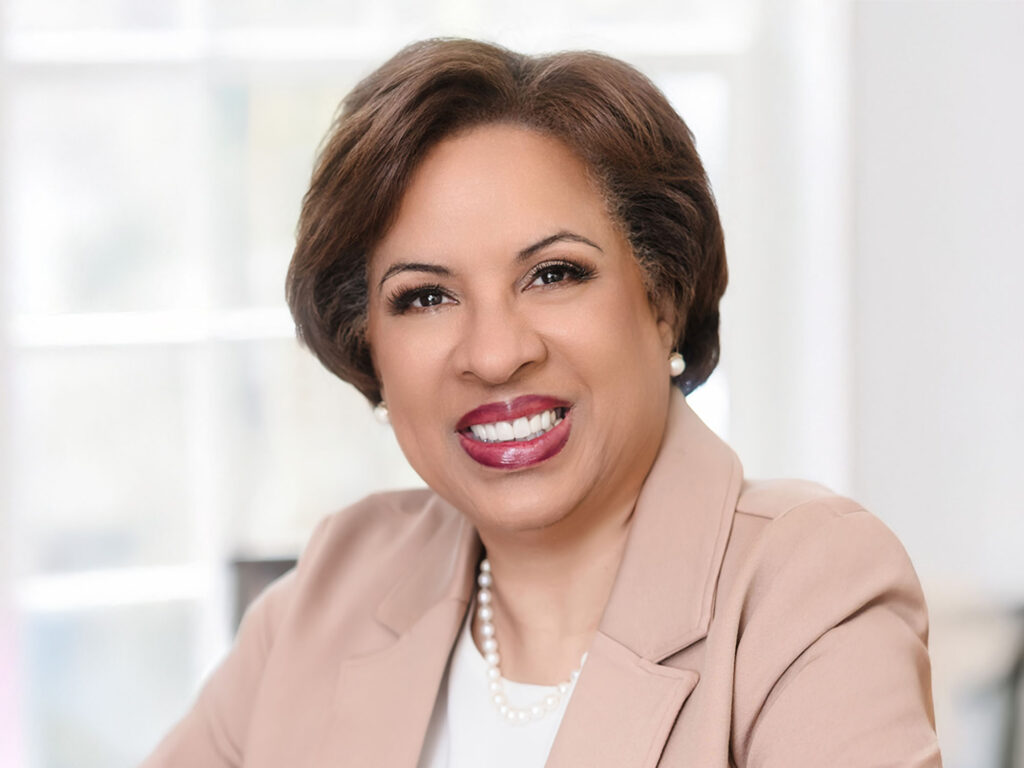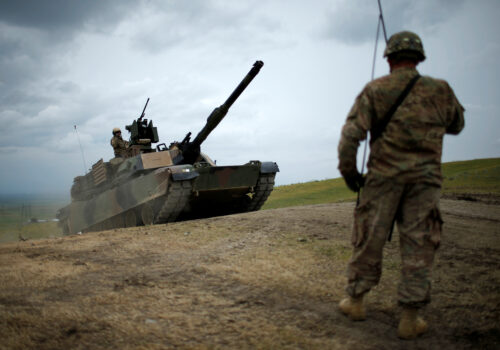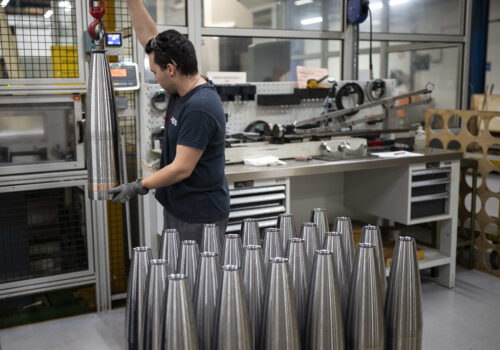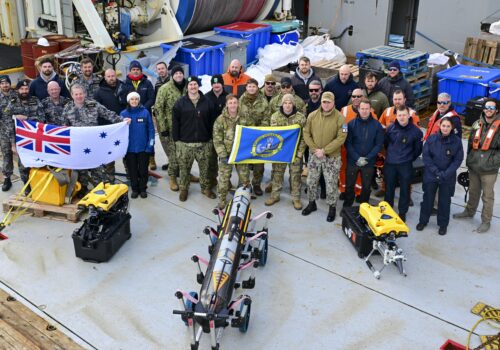Watch the event
In SAIC Chief Executive Officer Toni Townes-Whitley’s view, it will take much more than top tech to win the wars of the future.
“You can win a battle with some phenomenal tech,” she said at an Atlantic Council Front Page event on Thursday. “But if we’re talking about durable, long-term regional conflict, to win wars, you have to have an ecosystem of capabilities.”
For Townes-Whitley, having such an ecosystem—one that joins academics, investors, innovators, and government officials behind common national-security objectives—depends on mission integration. It requires an “open” architecture that accommodates innovation from this wider ecosystem, instead of maintaining exclusivity, or “vendor lock,” for the biggest competitors in the defense industrial base.
“Commercial technology, as important as it is, as critical as it is, is not the only answer,” she said. “For war fighting going forward, our national security needs . . . integration, and it has to drive toward interoperability.”
In short, as Townes-Whitley put it: The United States needs to “leverage all that this country creates in the war fight.”
Below are more highlights from the conversation, moderated by Atlantic Council President and Chief Executive Officer Frederick Kempe, which was held as part of the Captains of Industry series of the Scowcroft Center for Strategy and Security’s Forward Defense program.
Play the player
- Townes-Whitley argued that adversaries such as China and Russia have already worked to assemble a wide ecosystem for both defense and warfare, with China leaning into asymmetric and hybrid warfare and Russia heightening its cyberwarfare activities.
- “We have a change not only in who the players are, how they engage, where they show up, but quite frankly what they leverage,” she said.
- Thus, when it comes to a US-led innovation ecosystem, “we have to know how to leverage all of it to protect this country and to protect this planet,” she said.
- She added that Ukraine has similarly rallied a massive ecosystem for the sake of its defense, bringing together a “talented” and “tech-enabled citizenry” and gritty technologies—backed by policymakers who have “changed capital structures” to support the fight. “It’s been a phenomenal lesson for us,” she said.
- As European countries commit to ramping up their defense spending, they have a “leapfrog opportunity,” Townes-Whitley said, to prioritize mission integration first, instead of following “the US pattern of buying things” and having to make their defense tech interoperable later. “There’s an opportunity for them to use the best of commercial technology if they have a framework and engagement around mission integration,” she said.
High speed, high tech
- Townes-Whitley argued that an upfront investment in mission integration will help improve the United States’ speed on the battlefield as warfighting continues to change quickly.
- One reason, she explained, is that the “open and interoperable” architectures she envisions would be “plug and play,” erasing the need to ensure in advance that certain defense technologies are compatible with others.
- “The speed of compatibility is going to be . . . more of the pacing mechanism than just the commercial tech itself,” she said.
- Townes-Whitley said that as artificial intelligence (AI) advances, she sees a future in which “digital agents” are deployed for the sake of defense, making capabilities cheaper.
- But “there’s a big conversation about how much it gets regulated,” she argued. She said that the White House’s AI Action Plan reflected a “real openness to AI” and a “desire to not let a regulatory burden slow down the commercial AI.”
- Townes-Whitley argued that national security threats have expanded beyond traditional borders to include defending cyberspace and critical infrastructure, fundamentally changing how the homeland must be defended. As a result of this evolving landscape, “data has become the new currency,” helping people on the frontlines make more informed decisions faster.
- But still, Townes-Whitley said, the “stovepipe nature” of the military and structural issues between the Department of Defense and the intelligence community continue to serve as “blockers” to much-needed data integration and real-time analytics. “This is not a tech issue,” she said. “This is a policy issue. This is a structural issue.”
Sending a signal
- Townes-Whitley’s open architecture vision for the defense ecosystem will depend on whether the government can “send the right signal of long-term investment” to the private sector—and it will require officials across the government to send a consistent message.
- Townes-Whitley said that she is “thrilled” to see signals from the current administration that there is high demand for commercial technology.
- “The time is ripe right now for the country to evolve in our thinking of how we look at commercial technology,” she said, “how we look at investments and private equity, and how we look to bring those together for orchestration in the current world order.”
Katherine Golden is an associate director on the editorial team at the Atlantic Council.
Watch the full event
Further reading
Thu, Jul 24, 2025
Rethinking combined arms for modern warfare
Issue Brief By Edward Brady
To conduct all-domain operations, modern warfare requires a new approach to combined arms. The US military should reassess the future composition of its forces, integrating high-end manned platforms with low-end, attritable vehicles.
Wed, Jul 23, 2025
To meet NATO’s 5 percent benchmark, allies need more industrial capacity. Here’s how they can build it.
New Atlanticist By James Hursch, Kristen Taylor
Without more industrial muscle to increase defense production, the positive momentum coming out of The Hague summit could grind to a halt.
Tue, Jul 15, 2025
In the Indo-Pacific, US defense industrial partnerships go much deeper than AUKUS submarines
New Atlanticist By Adam Kozloski, Markus Garlauskas
The US review of AUKUS should be understood as part of a larger US effort to accelerate defense industry cooperation in the Indo-Pacific.
Image: SAIC Chief Executive Officer Toni Townes-Whitley speaks at the Atlantic Council on July 24, 2025 in Washington, DC.
